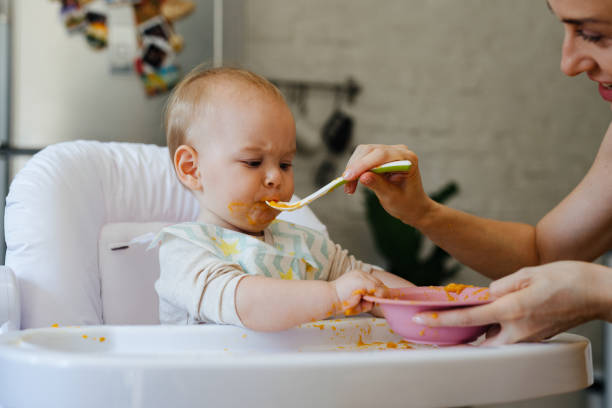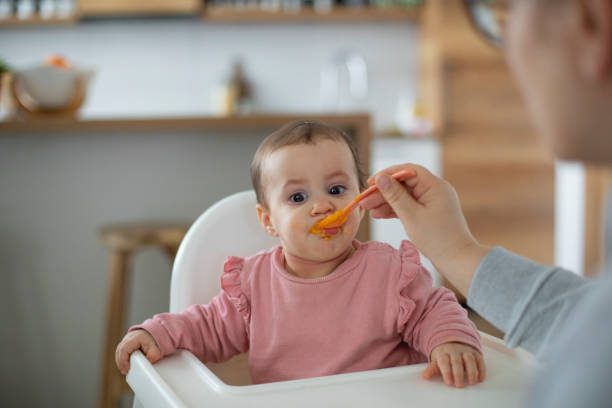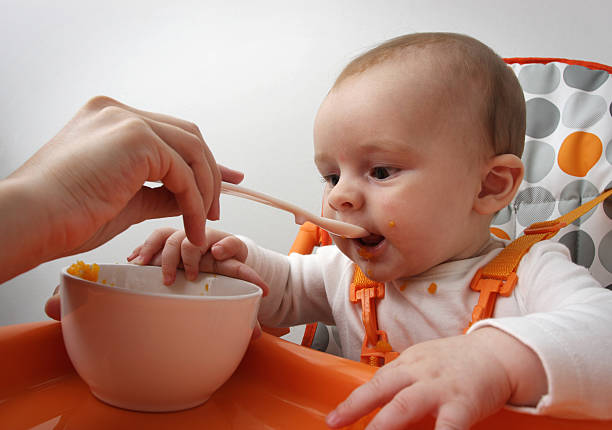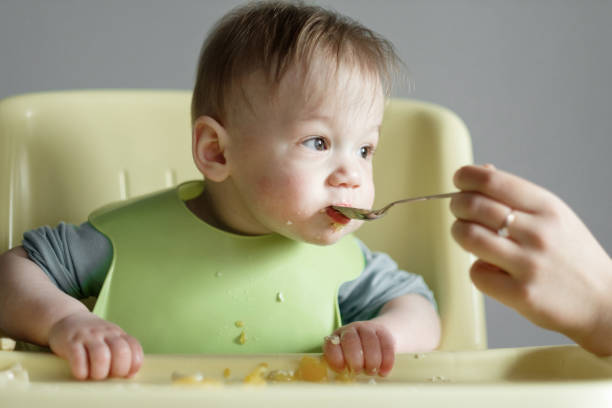
Why Your Baby Should Eat The Best Choice Organic Baby Food
Best Choice When it comes to feeding your baby, some parents are simply spoiled for choice. Many parents will agree that options for organic baby food are on the rise due to increased consumer awareness regarding chemicals, pesticides, and additives in conventional foods. Not only is organic baby food free of harmful chemicals it also gives your baby the proper nutrition that he/she will need for growth and development.
With that in mind, today we want to talk about why organic baby food is best for your bundle of joy. Navigating the world of baby food is no easy task, but the safety benefits and nutritional advantages matter too, Best Choice in this post we will equip you with everything you need to make an informed decision for your baby health.
Table of Contents
Healthy Baby Food: The Initial Step
When it comes to your baby, making sure that they are getting the best possible nutrition is probably one of your top priorities as a parent during those early years. What you expose your baby to in terms of food has a tremendous effect on their journey into toddlerdom and beyond… Which is why you need to buy healthy, quality baby food.
Many parents have started preferring organic baby food, as it is a safe option without harmful chemicals and additives. Organic Garden Fresh Baby Food: Whereas traditional baby food may likely include pesticides, artificial preservatives or genetically modified elements, the organic baby meals are produced without using synthetic pesticides, fertilizers, or dangerous chemicals. Best Choice Even better that you can be rest assured knowing, that the food you’re giving your little one is almost as close to nature as possible.
In this article, we will discuss reasons why Organic baby food is best for your baby in term of nutrition, safety, and long-term benefits of organic baby food vs conventional. If you are a new parent or looking for healthier dietary choices and sources of nutrition for your little one, look no further, this guide can help in making foods leaves up to your newborn to adolescent grow stronger while still keeping the right balance.
How Organic baby food is different from the regular ones?
Fundamentally, organic baby food is grown differently than that of standard baby food. Organic food that gour by avoiding the synthesized pest, chemical fertilizer,(GMO; genetically modified organisms). This also ensures that the food does not contain chemical traces which can affect the health of your baby. Conversely, regular baby food could have strains of pesticides and preservatives that over time have been revealed to create health problems.
Besides the farming procedures, natural little one meals is usually fresher and denser in nutrients. Focusing on the soil- Organic farming practices are built around maintaining quality, healthy soil, leading to better, tastier and far more nutrient dense food items. With their still developing immune systems, babies will be more sensitive to the adverse effects of chemicals in food and therefore organic is a better choice for them.

Unaffected by Hazardous Materials: The means by which Organic Baby Food protects your Infant
Safety is among the top concerns every parents assembles when it comes to choose baby food. Some standard baby food varieties are imbued with pesticides, herbicides, and the sort of fabricated added substances that can be unsafe to your child’s immature body. Some research has found that exposure to particular chemicals in the first years of life may cause developmental problems, allergies and even chronic diseases.
On the other hand organic baby food is made without pesticide. Organic agriculture uses natural techniques such as crop rotation, composting, and biological pest control to improve soil health and safeguard plants. By doing so, you are avoiding the use of harmful pesticides and fertilizers that could find their way into your little one’s food.
If parents worried about their children being exposed to chemicals choose organic form when possible they will receive some comfort. Best Choice By exposing your baby to food not containing these potentially harmful substances you are lessening the chance of health issues such as hormone disruption, allergies and developmental problems.
Nutrient-Rich: The Advantages of Organic Baby Food
Organic baby food provides colossal nutritional benefits. Compared to conventionally grown produce, organic fruits, vegetables, and grains are generally more abundant in many vitamins, minerals and antioxidants. Fertilizer-free farming inhibits soil nematodes that feed on crops, and thus also reflect the nutrient quality of the food. Best Choice
Multiple studies have shown that organic fruit and vegetables provide significantly higher concentrations of a range of nutrients, such as vitamin C, iron, magnesium and phosphorus. These are important nutrients for laying a good foundation for health in babies who have not yet developed their immune system.
More importantly, there is a lower chance of harmful substances that can be found in the non-organic baby food including preservatives, colorings, flavorings and other such harmful additives. They may disrupt your babies digestive function, as well as affecting their overall health these are common chemicals used in conventional baby foods. So although baby food is supposed to be full of nutrients that your baby needs, packaged formula can be stripped away of many vital vitamins and minerals; leaving you with empty calories.
Allergies: Natural Baby Food, A Smoother Choice For Upset Tummies
Some even have sensitive tummies, and allergies are a major source of anxiety among moms and dads. Organic baby food may be easier on the tummy for babies with food sensitivities or allergies since organic baby foods are less likely to contain common allergens such as artificial additives or preservatives that can lead to digestive problems and allergic reactions.
Organic food carries a lesser risk of food allergies than non-organic; without GMOs and chemicals that have been tied to allergic reactions in some children, kids are less likely to experience problems. Selecting organic produce and grains decreases the possibility of triggering sensitivities that can lead to discomfort or medical problems for your baby.
Furthermore, organic baby food contains no gluten and is unlikely to contain other common allergens. When we talk about organic baby food, there are many brands providing products suitable for babies with specific requirements such as gluten-free, dairy-free and nut-free.
How To Boost Your Baby’s Immune System With Organic Foods
As the baby’s immune system is still maturing, your baby remains vulnerable to infections, diseases and also toxic substances in their atmosphere. Best Choice Organic baby food helps strengthen the immune system, providing healthy and natural foods that contain nutrients essential in enhancing the body’s defense mechanisms. Best Choice
So, lots of organic foods are home to these immune-boosting vitamins like vitamin C, vitamin A and zinc and help protect from common colds and other infections. Best Choice In addition, organic baby food is prohibited form the type of synthetic additives and preservatives that are often used to make conventional baby foods – chemicals which could very well overload or weaken your babies immune system.
But also organic foods are higher in antioxidant vitamins, which reduce oxidative stress and benefit your bub for a lifetime. Organic baby food can take over this responsibility, as babies have developing immune systems and need all of the extra help they can get.

Planet-Friendly: The Environmental Impact of Organic Baby Food
Yes, we often focus on the benefits that organic baby food will bring to your little one in terms of nutrition but it is also vital that you think about the effect both have on the environment! The principles behind organic farming practices indicate that it should be more sustainable and environmentally friendly than traditional farming. Best Choice Happy Baby Organic is a great example of an organic baby food that is available for babies. Best Choice
Best Choice The lesser use of synthetic chemicals and farming practices prevents the pollution caused by them in water, air, and soil. It encourages biodiversity and lessens the need for the use of chemicals in pest control through crop rotation. Going for organic baby food bottom-line reduced footprint of that environmental effect on your baby due to excessive application of pesticide and fertilizer widely used by conventional farms.
How To Boost Your Baby’s Immune System With Organic Foods
As the baby’s immune system is still maturing, your baby remains vulnerable to infections, diseases and also toxic substances in their atmosphere. Organic baby food helps strengthen the immune system, providing healthy and natural foods that contain nutrients essential in enhancing the body’s defense mechanisms.
Best Choice So, lots of organic foods are home to these immune-boosting vitamins like vitamin C, vitamin A and zinc and help protect from common colds and other infections. In addition, organic baby food is prohibited form the type of synthetic additives and preservatives that are often used to make conventional baby foods – chemicals which could very well overload or weaken your babies immune system. Best Choice
But also organic foods are higher in antioxidant vitamins, which reduce oxidative stress and benefit your bub for a lifetime. Organic baby food can take over this responsibility, as babies have developing immune systems and need all of the extra help they can get. Best Choice
Planet-Friendly: The Environmental Impact of Organic Baby Food
Yes, we often focus on the benefits that organic baby food will bring to your little one in terms of nutrition but it is also vital that you think about the effect both have on the environment! Best Choice The principles behind organic farming practices indicate that it should be more sustainable and environmentally friendly than traditional farming. Happy Baby Organic is a great example of an organic baby food that is available for babies. Best Choice
The lesser use of synthetic chemicals and farming practices prevents the pollution caused by them in water, air, and soil. Best Choice Best ChoiceIt encourages biodiversity and lessens the need for the use of chemicals in pest control through crop rotation. Going for organic baby food bottom-line reduced footprint of that environmental effect on your baby due to excessive application of pesticide and fertilizer widely used by conventional farms. Best Choice
Guide to Selecting the Best Organic Baby Food for Your Child
Finding the right organic baby food can be overwhelming with so many brands and choices in front of you. Tips to help you choose the right one for your little one:
Choose quality and explore : Pick organic baby food brands that have a great reputation for sourcing and high-quality ingredients.
Caution that its certified: The food needs to have… well USDA Organic certification√
Keep it basic when beginning solids: Immediately exposing your baby to certain tastes like pureed fruits or vegetables–without ointments, spices, salt and preservatives added if feasible.
Selecting baby food which is suitable for your infant’s developmental stage whether it be initial meals, treats or toddler meals
Check labels: Always check the ingredients list, to confirm that the food contains no artificial additives and preservatives.
INORGANIC BABY FOOD & ORGANIC BREAKDOWN
Organic baby food vs. Conventional option: Organic foods are higher in nutrition, lower in chemicals and more sustainable than most conventionally produced foods. While conventional baby food may have trace amounts of pesticides, fertilizers and GMOs, organic baby food contains none at all.
In addition, organic foods are often minimally processed and free of additives and preservatives as it is relatively common for conventional baby food to contain many ingredients not found in nature to help with flavor, color and shelf life. Both non-organic and organic baby food are safe, but organic baby food is the more risk-free choice that provides a cleaner & natural option.
Organic Baby Food as an Important Part of Your Baby or Toddler S Early Development
Early in life, your baby will experience the fastest-growing period that will happen in their body and brain. Therefore, the nutrition they receive during this period plays a significant role in determining their long-term health, cognitive development, and growth. Best Choice The organic baby food is a great provider of vitamins, minerals and antioxidants that favour proper brain development, strong bones and healthy immune system([1]).
Organic foods are high-quality nutrients that can help your baby reach the critical milestones in development. They pass through pesticide and synthetic chemical-free habitation cultivation, turning out to be naturally grown baby food, devoid of any artificial ingredient supplementation in contrast. Best Choice
PARENT’S GUIDE TO CHOOSING THE RIGHT ORGANIC BABY FOOD BRANDS
When choosing an organic baby food brand, look for quality ingredients, transparency and certifications. Seek brands that offer organic sourcing, quality ingredients with no additives or preservatives. Best Choice Then also the kind of baby food (purees, finger foods and snacks) and search for brands that have options which can cater to your babys taste palate and interests.

Is Organic Baby Food at Home Better than Store-Bought?
Organic baby food, whether homemade or purchased at a store, both have their pros and cons. When making your own baby food from organic ingredients, you know exactly what is going into their meals and can choose the freshest, most natural foods for them. But if you are in the middle of an urban setting, store-bought organic baby food can be pretty convenient and even cheaper for parents who are extremely busy. Both are options to have and both will also be healthy as well, But a lot of parents still prefer combination of both homemade and store-bought organic baby food for the reasons for convenience in using them on a daily basis and also variety.
Trends and Insights Behind the Rising Demand for Organic Baby Food
In recent years, the demand for organic baby food has increased considerally because parents are now looking for better and much safer food choices for their children. Today, you can easily find organic baby food brands on the shelves of supermarkets and grocery stores, with options suitable for numerous dietary requirements and personal preferences. Best Choice To meet this rising demand for organic and natural food, development has taken place at a fast rate in the industry, resulting in a wide variety of high quality & affordable organic baby food choices.
So, while you are at it and making decisions for your little one’s health and safety, do not forget about the organic baby food as well for a cleaner and greener beginning of life!
Why Organic Baby Food is the Best and Safest Option for Your Baby at the End of the Road
To summarize, organic baby food should be the educated decision for your baby with lots of benefits.Parenting18103 Organic baby food offers a cleaner, Best Choice healthier alternative for your bundle of joy right from the lack of harmful chemicals and pesticides to better nutrient value and eco-friendliness! While supporting the health of your baby, Best Choice choosing organic, along with helping to make a healthier planet.
